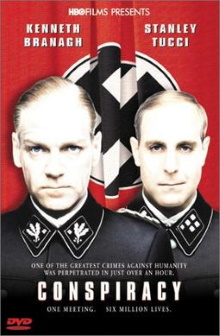This remarkable film was originally made for television and essentially dramatizes the only surviving transcript of the 1942 Wannsee Conference. This was of course the famous conference in which Nazi officials settled on the implementation of the so-called final solution to the Jewish question. This film reenacts the meeting in almost real time, down to the smallest detail. You might think that a film that consists only of discussions in a meeting to be dreadfully boring, but it is amazing how much psychological depth can be discerned in here and the total commitment that the Nazi had to eradicating Jews never ceases to shock.
Adolf Eichmann oversees the staff preparing the villa to receive representatives from many different agencies of Nazi Germany, including those charged with administering newly conquered territories. Chairing the meeting is Reinhard Heydrich who explains to all present that their purpose is to decide exactly how to implement Hitler’s policy that Jews should be completely eliminated from everywhere controlled by Germany. As both of the SS officers explain, Germany is swamped by Jews, causing numerous problems in containing and feeding them, and no other countries are willing to take them in. They discuss methods of sterilizing Jews and argue over the exact terms by which Jews are to be identified. Some express frustration that this process would take too long to fully eliminate the Jews and others question the need to resort to euphemisms when all agree that outright genocide is what everyone wants anywhere. Eventually the SS reveal that they are already experimenting with poison gases and are in the process of building camps that will allow them to kill Jews on an industrial scale.
It may be a little daunting if you’re not a historian to watch all these people you don’t know sit around a table and just talk for an hour and a half. But it is impressive how the film is able to establish their personalities and motivations from that alone. One guy for example goes around to everyone introducing himself as representing the office of the 4-year-plan, from which we infer that he is among the lowest ranked in the room. He is later one of those opposed to outright gassing the Jews as he insists their labor is needed to meet Germany’s war production needs. A central tension in the meeting is that on one side are the SS officers and on the other everyone else. Though the agenda is ostensibly about how to deal with the Jews, it becomes increasingly clear to everyone that the SS has already decided what to do beforehand and the real point of the meeting is for the SS to firmly assert their authority over everyone else. Heydrich seems affable in demeanor and insists on being civilized by playing the part of the gracious host. But that doesn’t stop him from threatening those who are hesitant to go along with his agenda.
What gets me the most is how they are all absolutely committed to killing Jews to the point where they are actually willing to sacrifice the war effort to do it. As they put it, the point of the war is to kill Jews anyway. The most vocal and passionate naysayer is Wilhelm Stuckart, a co-author of the Nuremberg Laws. He condemns the silly caricatures of Jews as they trivialize the serious nature of the threat and he insists on strictly adhering to the law as this proves that the Germans are the superior, civilized race. The only one to object on any kind of moral grounds is Gerhard Klopfer who thinks that outright genocide is a step too far. Heydrich mocks him for it, saying that he is perfectly fine with imprisoning the Jews in ghettoes, confiscating their wealth and starving them, but actually killing them is a no-no. Meanwhile those in charged of the newly conquered territories in the east are only concerned that their Jews be given the highest priority as their large numbers are causing them many problems but Heydrich insists that the Jews in Germany itself will be eliminated first.
This film can’t be fully accurate to history as it includes small talk and asides in the dialogue that wouldn’t have appeared in the transcript of the meeting. It also isn’t true that this is the one fateful meeting where Nazi Germany decided on the so-called final solution. The real decision makers were people like Hitler himself, Heinrich Himmler and Martin Bormann and this meeting consisted only of their underlings one tier down from them. But in a way this only makes this film more chilling, in them being bureaucrats and administrators meeting to decide on the practicalities of implementing the policies their bosses have decreed. The banality of evil is a phrase usually associated with Adolf Eichmann and it perfectly describes the kind of evil we see here.
